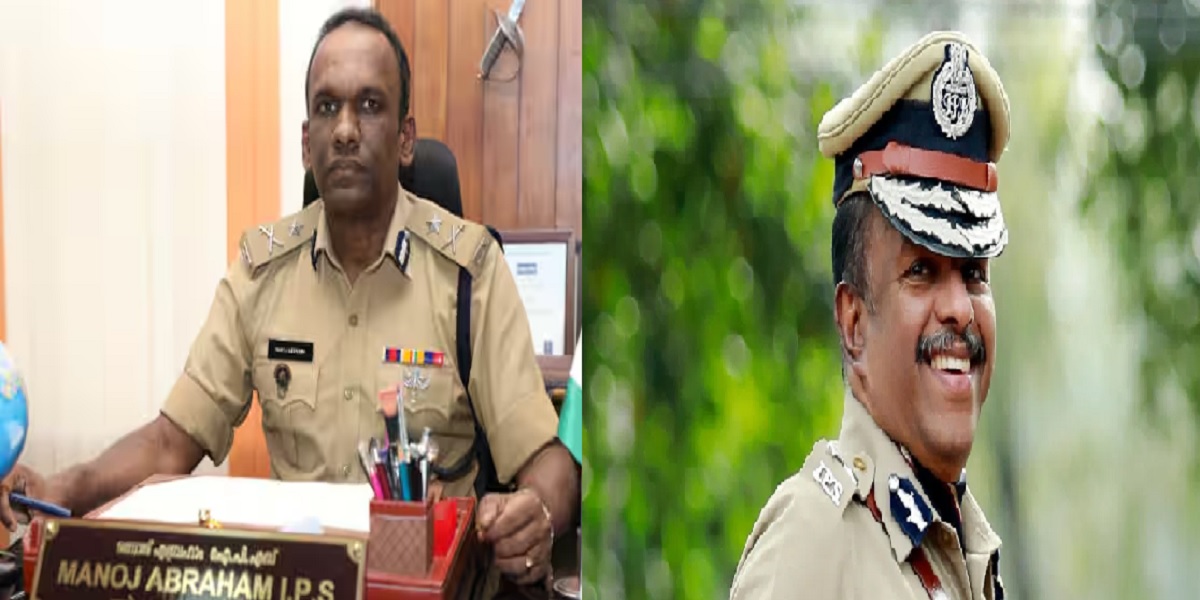Contradictions within the Kerala Police have emerged over the Thrissur Pooram investigation, with ADGP Ajith Kumar clearing the police, while ADGP Manoj Abraham blames them, highlighting concerns of transparency, accountability, and internal discord.
Published Jan 05, 2025 | 3:01 PM ⚊ Updated Jan 05, 2025 | 6:13 PM

ADGP Manoj Abraham submitted a report on the Thrissur Pooram disruption.
Sharp contradictions have emerged within the Kerala Police over the investigation into the Thrissur Pooram controversy, exposing a lack of clarity and possible internal discord among top officials.
While Additional Director General of Police (ADGP) MR Ajithkumar gave a clean chit to the police, a report submitted by ADGP Manoj Abraham singled out the police as the only department at fault.
However, the conflicting conclusions of senior officers raise questions about transparency, accountability, and possible rifts within the administration.
Abraham submitted a report to the government following the three-tier investigation into the disruption of Thrissur Pooram. The report concluded that the fault lies solely with the police force, with no other departments being held responsible.
As part of the investigation, the roles and potential lapses of the forest department, local bodies, fire force, and explosives division were thoroughly examined.
The report, which includes 20 recommendations, suggests that officials should be more cautious when approving firecracker permits. It also states that if permission is granted, the responsibility for overseeing such activities would be transferred to the Devaswom boards.
The first phase of the three-tier investigation is now complete, and the findings have been submitted to the government.
Two weeks ago, Ajithkumar submitted an inquiry report on the Thrissur Pooram disruption, giving a clean chit to the Kerala Police. The report revealed that the disturbances were part of a deliberate scheme aimed at influencing the 2024 Lok Sabha elections.
It uncovered that certain individuals connected to the Thiruvambady Devaswom, in collaboration with their associates, orchestrated the disruptions in an effort to manipulate the public perception of both the district administration and the state government.
The investigation specifically identified five key officials from the Thiruvambady Devaswom — Sundar Menon, Gireesh Kumar, Vijaya Menon, Unnikrishnan, and Ravi — along with two other individuals, Jose Thonikkal and Krishnadas, as the primary conspirators behind the plot.
On 3 October, Chief Minister Pinarayi Vijayan ordered a three-tier investigation into the alleged disturbances during the Thrissur Pooram festival in April. The first inquiry, led by Director General of Police (DGP) Shaik Darvesh Saheb, focused on possible negligence by Ajithkumar, who was then in charge of Law and Order.
Abraham has been tasked with investigating any lapses by the concerned officials during the Thrissur Pooram, while Crime Branch ADGP H Venkatesh will probe the conspiracy angle.
On 17 October, a specialised team was set up, led by ADGP Venkitesh, to investigate the criminal activities believed to have caused the disturbance. The team includes Deputy Inspector General (DIG) Thomson Jose, Kollam Rural Superintendent of Police (SP) Sabu Mathew, Kochi Assistant Commissioner of Police (ACP) P Rajkumar, Vigilance Deputy Superintendent of Police (DySP) Biju V Nair, and Inspectors Chittaranjan and R Jayakumar.
The report by Ajithkumar, who was previously overseeing Law and Order, suggested that criminal acts might have played a role in the disruption of the festival.
On 18 December, despite ongoing investigations, including allegations of amassing disproportionate assets, the Kerala government decided to promote Ajith Kumar to the rank of DGP. The cabinet made the decision based on the recommendation of the IPS screening committee.
The screening committee, consisting of the Chief Secretary, the DGP, and the Home Secretary, concluded that the investigations against Ajithkumar would not stand in the way of his promotion.
Reports indicate that if ADGP Suresh Raj Purohit, currently on central deputation as the Inspector General (IG) of the Special Protection Group (SPG), did not return by February, Ajithkumar would be considered for the DGP position.
Ajithkumar’s promotion is expected to occur after the retirement of the current police chief, Darvesh Saheb, on 1 July.
On 6 October, under mounting pressure, Ajithkumar was relieved of his responsibilities related to law and order. The decision followed a report submitted by Darvesh Saheb.
According to an official government statement, Ajithkumar was reassigned to the Armed Police Battalion. Subsequently, Manoj Abraham, who was serving as the Vigilance ADGP, assumed the role of ADGP (Law and Order).
However, within weeks of taking charge, Manoj Abraham took decisive action to dismantle a controversial parallel intelligence network that had been established during Ajithkumar’s tenure. By the first week of November, the 40 officers involved in this unofficial system were instructed to return to their respective parent units.
Ajithkumar had created the parallel intelligence setup without informing the DGP, despite the presence of established state and district special branches. This independent structure was directly controlled by Ajithkumar, bypassing standard hierarchical channels. Officers in this unit were stationed in the offices of SPs and commissioners, but operated outside their jurisdiction, raising serious concerns.
The primary allegations against Ajithkumar revolved around the misuse of this system for covertly monitoring political adversaries of the government and keeping tabs on certain police officers with questionable records. The DGP had lodged a formal complaint with the government, expressing strong opposition to the existence and operations of the parallel intelligence system.
(Edited by Ananya Rao)
